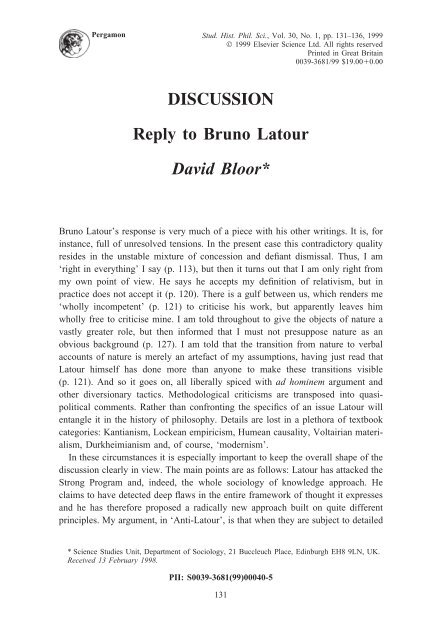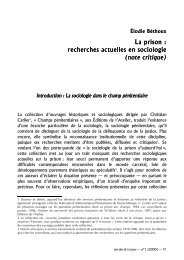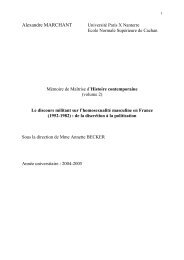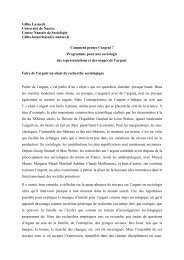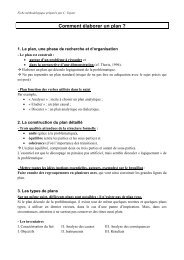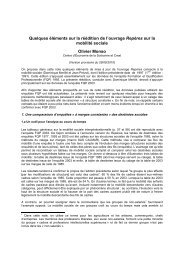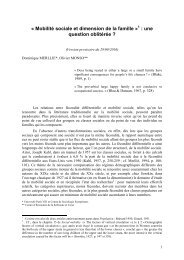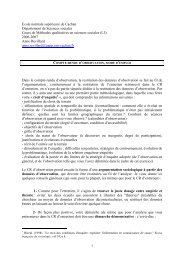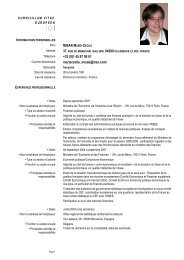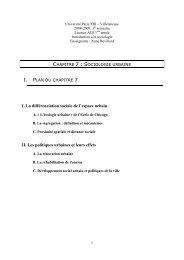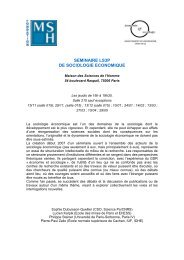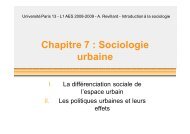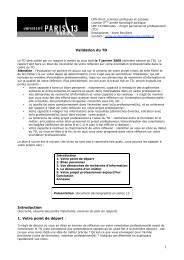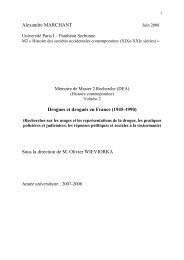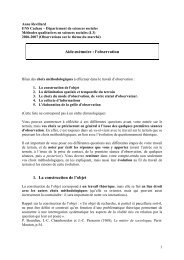DISCUSSION Reply to Bruno Latour David Bloor* - Melissa
DISCUSSION Reply to Bruno Latour David Bloor* - Melissa
DISCUSSION Reply to Bruno Latour David Bloor* - Melissa
Create successful ePaper yourself
Turn your PDF publications into a flip-book with our unique Google optimized e-Paper software.
132 Studies in His<strong>to</strong>ry and Philosophy of Sciencescrutiny both of these claims collapse. First, his understanding of the Strong Programis defective and its alleged flaws are really the products of his own misunderstanding.Second, the alternative he proposes, in so far as it actually differs fromthe Strong Program, is incoherent and indefensible. It is either completely obscureor it is inadequately motivated and justified. One of the main features of the allegedlynew approach, which it shares with some of the allied movements mentionedby La<strong>to</strong>ur, is that it represents an unprincipled retreat from the sociological program.It is essentially the sociology of knowledge in an emasculated form, withall its explana<strong>to</strong>ry and causal aims discarded. At this point we must not allowourselves <strong>to</strong> be sidetracked. We must address the question: has La<strong>to</strong>ur really metthese two criticisms? Has he been able <strong>to</strong> sustain his reading of the Strong Programand has he now clarified his own concepts and methods so as <strong>to</strong> demonstrate theirviability? I think he has not.To clear the ground I need <strong>to</strong> make two preliminary points. First, La<strong>to</strong>ur assuresthe reader that he knows the sociology of knowledge literature ‘inside out’ (p. 114).He has, he says, spent many years actually defending it. Was it not he who arrangedfor the French translation of my Knowledge and Social Imagery (Bloor, 1976)?Indeed it was and I owe him a debt of gratitude for this. Unfortunately none ofthese claims meet the point. Long acquaintance with a doctrine is no good if it is,after all, based on a long-standing misapprehension. Whether La<strong>to</strong>ur really knowsthe literature inside out is precisely the point at issue. My conclusion, and it hassaddened me <strong>to</strong> reach it, is that for many years he has been unwittingly spreadingmisinformation about the sociology of knowledge. Given his considerable influencein the field, then goodness knows what damage has been done.Second, after announcing his own qualifications La<strong>to</strong>ur seeks <strong>to</strong> discredit mine.He has been out there, rubbing shoulders with real scientists, following them aroundin their labora<strong>to</strong>ries. Where are my empirical, labora<strong>to</strong>ry studies? I have ‘no business’<strong>to</strong> criticise (p. 122). This man has never even been in<strong>to</strong> a labora<strong>to</strong>ry! (Hemeans as a sociological observer, not as a researcher doing experiments, for that,in a modest way, I have done.) Had I seen what he has seen, the argument runs,I should have unders<strong>to</strong>od his novel perspective. But are fieldwork credentials necessaryfor the questions I am putting <strong>to</strong> La<strong>to</strong>ur? The answer is no, because I am notchallenging his facts but his interpretations. A statistician can raise questions aboutthe analysis of data from an empirical study without setting foot outside the mathematicsinstitute. Theoretical physicists can detect uncontrolled variables in anexperiment without getting their hands dirty. I am doing something analogous. Thesimple division of labour does not preclude our talking rationally and critically, inboth directions, across the divide.Two quick illustrations will show that our differences do not lie in areas wherea labora<strong>to</strong>ry visit would make much difference. To begin with, I hardly thinkfieldwork has been responsible for, or would cure, the confusion in La<strong>to</strong>ur’s mind
<strong>Reply</strong> <strong>to</strong> <strong>Bruno</strong> La<strong>to</strong>ur133between the logic of zero-sum games and the principle of vec<strong>to</strong>r addition (p. 116,note 5). This is just a matter of thinking the thing through properly and keepingdifferent processes and principles separate. Next, consider La<strong>to</strong>ur’s emphasis onthe way scientists work hard <strong>to</strong> give their own favoured theories a greater credibilitythan those of their rivals. This is a plausible empirical claim about scientific behaviour,albeit a rather obvious one. My point is that La<strong>to</strong>ur is wrong <strong>to</strong> treat this asrunning counter <strong>to</strong> the relativism of the Strong Program. He thinks (StrongProgram) symmetry means that all theories have the same credibility, but it doesn’t.To draw attention <strong>to</strong> this error does not involve challenging his facts.Now <strong>to</strong> the all-important question of whether La<strong>to</strong>ur has answered my chargeof misrepresentation. I have already said I do not think he has, but La<strong>to</strong>ur is confidentthat he has ‘entirely vindicated’ himself (p. 120). He reaches this conclusionby simply repeating the old misunderstandings in a slightly different form. Takethe issue of the role of the material world in the construction of knowledge. WhatI called the charge of idealism and La<strong>to</strong>ur the charge of Kantianism is still beingrepeated. This time the misrepresentation depends on a conflation that runs throughouthis reply. Let me explain what that conflation is, where it comes from, and themischief it does.La<strong>to</strong>ur thinks that the highly important and consequential underdeterminationthesis is the same as the claim that experience of the world and the objects in it‘makes no difference’. The Edinburgh School, as he put it, ‘forbids things <strong>to</strong> makea difference <strong>to</strong> our belief system’ (p. 120). This theme of ‘making no difference’is repeated time after time, both in the text and captions <strong>to</strong> diagrams, and is eveninserted in<strong>to</strong> a quotation. As a gloss on the underdetermination thesis, however,this is wrong. Here is how the sorry process gets under way. La<strong>to</strong>ur complainsthat, in the Strong Program, objects and our experience of them, ‘don’t do verymuch’ (p. 116). He accepts, as if it were a generous concession, that the Program’sadherents count themselves as materialists or certain kinds of realist, but he stillposes the question, ‘are these objects allowed <strong>to</strong> make a difference in our thinking?’(p. 117, his emphasis). Without textual justification it is alleged that in the pastthis question has always been answered with a resounding negative. After citinga passage from ‘Anti-La<strong>to</strong>ur’, about the role of the electron in Millikan’s andEhrenhaft’s work, he implies that I am mired in contradiction. He wearily asks menot <strong>to</strong> tell him that objects do and do not play a role, that something ‘makes adifference and that it makes no difference’ (p. 117).La<strong>to</strong>ur’s fallacious moves, and the resulting perversion of the underdeterminationthesis, may be illustrated with a simple example. Imagine some prominent macroobjectthat is a salient feature of the environment of two observers. Call the objectX and the observers O1 and O2. After inspection, O1 declares that X belongs <strong>to</strong>class C1, while after the same kind of inspection O2 puts it in class C2. Theyagree it cannot truly be both, so each thinks the other is wrong. Why do they
134 Studies in His<strong>to</strong>ry and Philosophy of Scienceclassify differently? The underdetermination thesis says that in these circumstancestheir encounters with X are insufficient <strong>to</strong> explain this difference. Something else,something about O1 and O2 themselves, is needed for the explanation.Now, is this the thesis that the observation of X ‘makes no difference’? Is adefender of the underdetermination thesis committed <strong>to</strong> saying that things such asX are not <strong>to</strong> be thought of as making a difference <strong>to</strong> the situation described? Clearlynot. The general difference made by the presence of X is that, in appropriate circumstances,it is capable of prompting acts of classification and, in this case, givingrise <strong>to</strong> the disagreement between O1 and O2. If the object were absent there wouldbe no occasion for disagreement or, if there were a disagreement, it would beprecipitated by other causes and would arise by another route. We can at least saythat it would not be this dispute between them. So the object makes a differenceeven though, in the above scenario, it cannot explain the other difference aboutdivergent classification. The attempt <strong>to</strong> tie me in knots is little more than a playon words. La<strong>to</strong>ur has conflated a thesis of the form ‘makes no difference’ with aquite distinct one of the form ‘can’t explain this, specific, difference’. The first isthe one he imputes <strong>to</strong> me; the second is the one I hold. He has simply confuseddifferent ‘differences’.Notice that in my example the object X was not an invisible electron, it was avisible, macro-object. Underdetermination doesn’t depend on the object of referencebeing in any way elusive. Nor does it depend on the observer being passiverather than active and experimental. The argument goes through even if the ‘inspection’had consisted of handling X, cutting it up, heating it, passing electric currentsthrough it or, again, putting it in a cage with another X <strong>to</strong> see if they produce ababy X. It certainly doesn’t depend on, or push us <strong>to</strong>wards, thinking of the objectas a Kantian Ding an sich. La<strong>to</strong>ur is wrong <strong>to</strong> inform the reader that things andobjects in the Strong Program have ‘no other role than discriminating betweenphilosophical schools’ (p. 118)—as if they are just an expedient <strong>to</strong> fend off accusationsof idealism. Really, the richness of the natural world, and the complexityof the scientist’s engagement with it, is central <strong>to</strong> the thesis of underdeterminationwhen properly unders<strong>to</strong>od, and hence <strong>to</strong> the Strong Program.The person who is really in trouble over the agency of things is La<strong>to</strong>ur himselfrather than the naturalistic supporter of the Strong Program. He passes over thisproblem in silence, but just pause <strong>to</strong> think. If La<strong>to</strong>ur dismisses the Kantian thingin-itselfas good for nothing but somewhat desperate moves in philosophicaldebates, what are we <strong>to</strong> make of his own ‘entelechies’, ‘monads’ and ‘actants’which are neither in nature or society, nor in language (p. 124)? All requests forclarification of this extraordinary and ill conceived metaphysical exercise have beenmet by silence. If we ask ourselves whether we are one jot the wiser about La<strong>to</strong>ur’s‘actants’ after reading his response <strong>to</strong> ‘Anti-La<strong>to</strong>ur’ we surely have <strong>to</strong> admit thatwe are not.In a revealing passage, La<strong>to</strong>ur takes issue with my recommendation that we keep
<strong>Reply</strong> <strong>to</strong> <strong>Bruno</strong> La<strong>to</strong>ur135nature separate from verbalised accounts of nature. I spoke of driving a wedgebetween them and La<strong>to</strong>ur tries <strong>to</strong> have some fun at my expense on this theme.Imagine driving a wedge in<strong>to</strong> a tree trunk and rendering the connections of the parts‘problematic’ (p. 120). Why, he asks with incredulity, should someone, ‘engagein the strange contradic<strong>to</strong>ry task of severing what he wants <strong>to</strong> glue <strong>to</strong>gether?’(p. 120). The general form of the question admits of a very simple answer and itsays a lot about La<strong>to</strong>ur’s position that it does not occur <strong>to</strong> him. We take thingsapart in order <strong>to</strong> see how they fit <strong>to</strong>gether and how they work. If we can’t literallytake them apart we see if nature obliges by producing natural variations and differentcombinations of parts. How does this apply <strong>to</strong> knowledge? The answer is thathis<strong>to</strong>rical and cultural variation shows that the interface between language and thenon-linguistic world is a causal nexus of great theoretical interest. La<strong>to</strong>ur seemsunable <strong>to</strong> appreciate this and appears <strong>to</strong> dismiss this interface as a mere ‘artefact’(p. 122).One ‘modernist’ feature of the position taken in ‘Anti-La<strong>to</strong>ur’, and which La<strong>to</strong>uraffects <strong>to</strong> find ‘bizarre’, is what he calls my ‘extravagant distribution of forms ofagency’ (p. 119). La<strong>to</strong>ur thinks he has found ‘three types of causality’ (p. 118) inmy work and seeks <strong>to</strong> present it as if it were the last gasp of some creaking andcomplex cosmology. (At least, I think this is his point. There is little actual argumenthere.) Really the issue is not one of types of causality at all, so much asdifferent causal systems. But even if we speak loosely of physical causality andsocial causality that only makes two. How does La<strong>to</strong>ur get three? The answer isthat the very thing I explicitly say is not a causal relation, namely the relation of‘correspondence’, La<strong>to</strong>ur misreads as causal. It also transpires later that what hecalls this extravagant distribution of causality is taken over by him in an even moreextravagant form. He tells us that every entity actually manifests all three speciesof causality (p. 124). But I am afraid that, by this stage, I do not understand whathe is trying <strong>to</strong> say.While, by his own lights, La<strong>to</strong>ur has been making rapid strides in his researchprogram, the Strong Program is, allegedly, where it was twenty years ago. Let mefocus on just one counter-example <strong>to</strong> this claim, Barnes’s important, theoreticalpaper ‘Social Life as Bootstrapped Induction’ (1983). Here Barnes develops hisself-referring model of social institutions. It is elaborated in his book The Natureof Power (1988) and has been applied and developed in my Wittgenstein: Rulesand Institutions (Bloor, 1997) and Martin Kusch’s Psychological Knowledge(1998). La<strong>to</strong>ur shows no appreciation of what Barnes has done and this may bewhy he is able <strong>to</strong> convince himself that no progress has been made. He simplyassimilates Barnes’s work <strong>to</strong> Durkheim’s, seeing it as nothing but a version ofDurkheim’s famous thesis that social reality is sui generis. There are elements ofthe self-referential in Durkheim, for instance in his picture of religion as societyworshipping itself, but a comparison on that level of generality fails <strong>to</strong> do justice<strong>to</strong> the power and novelty of Barnes’s approach. It renders invisible the role played
136 Studies in His<strong>to</strong>ry and Philosophy of Scienceby inductive learning, the valuable ideal types he introduces, called N-predicatesand S-predicates, each with their precisely defined patterns of employment, andthe revealing way he uses his analytical apparatus <strong>to</strong> build up certain very simplesocial structures. Instead of dismissing the self-referential model, taking for grantedthat it embodies ‘the worst defects of Durkheim’ (p. 118), La<strong>to</strong>ur would be advised<strong>to</strong> address it properly and responsibly. Such labour may lack glamour, and willcertainly seem pedantic <strong>to</strong> those in a hurry, but it is the only way <strong>to</strong> ensure thatin our theoretical work we are not just building a house of cards.If La<strong>to</strong>ur had thought through the implications of Barnes’s work, or evenreflected on what was said on the subject in ‘Anti-La<strong>to</strong>ur’, he would not haveneeded <strong>to</strong> pose the question he does on p. 118. He wants <strong>to</strong> know how <strong>to</strong> relateself-referring social institutions <strong>to</strong> a world of external and independent objects. Ishall repeat the answer given in ‘Anti-La<strong>to</strong>ur’ because the issue is important. Itreveals the mechanisms by which society is implicated at the most fundamentallevel in our understanding of the material world. Self-referential, social, processesgive concepts their normative properties, that is, their standards of right and wrongapplication. This applies <strong>to</strong> all concepts, including those referring <strong>to</strong> the objectsaround us. Self-referential processes constitute the rules for the use of the concept,which is how this all connects with Wittgenstein’s account of rule-following as aninstitution. Without rules and normative standards defining their right and wrongapplication, concepts could not properly be said <strong>to</strong> have a content, and without acontent they can have no genuine reference at all. In this way self-referencebecomes integral <strong>to</strong> external reference. These are the connections which eluded La<strong>to</strong>ur.Finally, I must make some response <strong>to</strong> La<strong>to</strong>ur’s interesting revelation (p. 127)that he is about <strong>to</strong> discard his generalised version of the symmetry principle. Giventhe picture of breathless progress painted in his reply, with new and ambitiousenquiries being announced, it is all <strong>to</strong>o easy <strong>to</strong> see this declaration as proof of howrapidly things are moving forward in the La<strong>to</strong>urian camp. What a contrast withthe boring stasis in Edinburgh! But there is another construction that might be pu<strong>to</strong>n it, one more consonant with his failure <strong>to</strong> produce a convincing reply <strong>to</strong> ‘Anti-La<strong>to</strong>ur’. This is not an advance at all, it is retreat. La<strong>to</strong>ur has just abandonedhis position.ReferencesBarnes, B. (1983) ‘Social life as bootstrapped induction’, Sociology 17, 524–545.Barnes, B. (1988) The Nature of Power (Oxford: Polity Press).Bloor, D. (1976) Knowledge and Social Imagery. (London: Routledge; 2nd edition, Chicago:Chicago University Press, 1991).Bloor, D. (1997) Wittgenstein. Rules and Institutions (London: Routledge).Kusch, M. (1998) Psychological Knowledge. A Social His<strong>to</strong>ry and Philosophy (London:Routledge).


